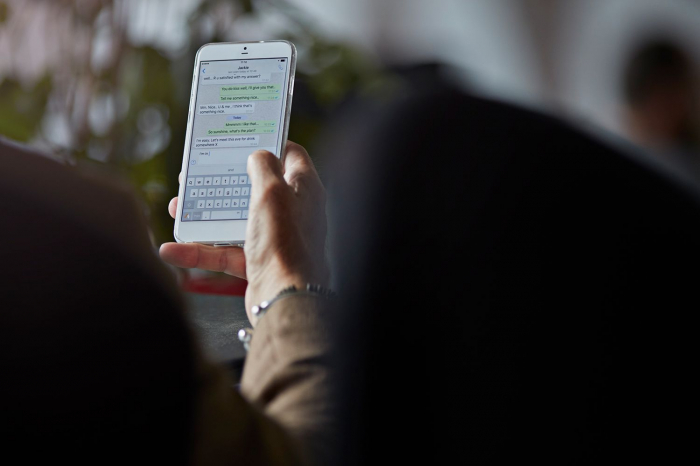I’ve taken to switching my phone’s ringer on between 8.30pm and 10.30pm on a week night. It feels like a dangerous act, for someone who used to be part of the “no phone calls allowed” brigade.
There are lots of things to panic about with a phone call, chief among them being: what if we run out of things to say, and there’s, God forbid, silence?
There’s no curation of the witty comeback. There’s no inserting the perfect emoji. It’s two human beings, inside each other’s ear, trying to figure each other out and connect.
Over the past few months, I’ve become a phone call evangelist, because I’ve discovered a small group of my friends (men and women in their mid-30s to early 40s) love to talk on the phone. Like, for hours. And, damn, it feels really, really good.
One of these friends usually calls me at around 10pm. He’s told me that he worries it’s uncivil to do so, but he’ll have noticed I’ve posted something on the socials, so deduces I must be awake. I know what’s coming: anywhere from 20 minutes to two hours of conversation that traverses everything from pop culture, politics, our days at work, our mutual friends, to whose nanna was the most magical.
Sometimes it’s the best part of my day.
We’ll spend a lot of these conversations trying to make each other laugh, but I’ve also noticed we’re both able to share a little more in this telephonic friendship than we do in real life (our real-life friendship also being a very robust one). The lack of eye contact means some questions are easier to ask and some things are easier to reveal.
It’s like being transported back to high school in the 90s, where you’d be at school all day, and at night, extension chord dragged into the pantry while the rest of the house slept. Phone D&Ms (“deep and meaningfuls”) were one of the great emotional releases in pre-mobile teen life, a chance to talk away the existential drama of the school day.
When it’s finally time to wind things up on one of these nocturnal phone communions, I’m usually snuggled into bed already. The covers are pulled up and I’m off to sleep with a goofy smile on my face.
Why these goofy, smiley feelings? These conversations aren’t romantic. They’re taking place inside an already strong platonic friendship of some years that’s made its way to the phone.
Why do these feelings come with a phone call, yet not with a night of texting or messaging backwards and forwards?
It might be because in our culture of busy-ness, someone taking time out to phone you and have a non-necessary phone conversation means they’re effectively saying “I have time for you. You matter to me.”
Dr Lila Landowski, a neuroscientist at the University of Tasmania, says it’s all about the endorphins: “When we talk to people we care about – whether in person or over the phone – we know that our brain releases oxytocin. Oxytocin is responsible for that feeling of being close and connected to someone. And it doesn’t just make us bond with people, it also makes us feel better, by reducing the levels of stress hormones, like cortisol, in our body.”
She says text messages and emails just don’t do the same thing: “Text messaging activates the brain’s reward pathway, but it doesn’t seem to result in the release of oxytocin.”
Culturally, the smartphone means we’re moving further and further away from phone calls, as countless column inches devoted to the welcomed death of them attest..
A social media callout to people born after 1988 (none of them were picking up their phone) showed an intense distrust of a phone conversation. Growing up with mobile phones and messaging means a phone call can be viewed an aggressive personal intrusion. A phone call means less time to formulate a response. It means more vulnerability to another person.
Yet it would seem those who avoid the phone call are missing out.
Professor Barbara Keys from the University of Melbourne wrote in the Conversation: “The voice is one of our most powerful instruments, designed not only to communicate but also to build intimacy. Our voices convey emotion so effectively that we can identify emotions in speech even when the words themselves are muffled by walls. The voice indicates whether you are sincere – or whether you are drunk.”
She also points to research out of Germany in the 1980s that found that the humble phone call “made people feel wanted, needed, included and involved.” Keys’ writing about the social and political implications of fewer phone calls is also worth seeking out.
That’s certainly the case for new mother Lucille Cutting, 30.
“I’ve reverted back to doing them [making phone calls] now that I’m on maternity leave. They’re great for when I go for long walks with the pram and actually have head space for a conversation. It’s like a dose of endorphins, regardless of whether it’s a happy or slightly sad chat.”
Gretchen Miller, 51, is a radio-maker who spends a lot of time thinking about sound and communication, and is a fan of the phone D&M.
“I still hear the ‘phone voice’ as intimate. It signifies intimacy for me – the receiver pressed to the ear, the thin sound of the voice and the depth of the stories ... that all means closeness.”
For me, I no longer see a night at home as a gaping chasm of time to be filled with a TV show I’m only half-interested in, sucking on a few pieces of chocolate and getting lost down internet rabbit holes.
Tonight, headphones in, a phone call or two means I’ll discover something new about someone I care about, laugh at least three times, reveal something I wouldn’t tell anyone else and maybe even discover a new Liza Minnelli impersonator I’d never heard of.
And how bloody cup-filling is that?
The Guardian
More about: conversations













-1747837442.jpg&h=190&w=280&zc=1&q=100)


































